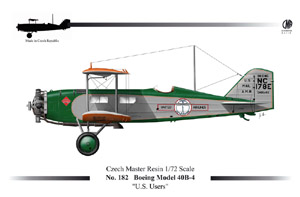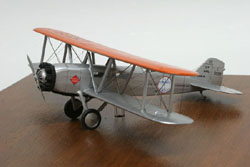Czech Master Resin 1/72
Boeing Model 40B-4
“U.S. Users”
|
 |
Introduction
The Boeing Model 40 was designed, built and flown in 1925 in response
to a US Post Office Department specification for a mail plane to replace
the DeHavilland D.H. 4Ms then in service. The Model 40 was powered by
a 400 hp Liberty V-12 and featured an Albatros-like fuselage of laminated
wood from the firewall aft. Although the Post Office Deptartment bought
the airplane the Douglas M series, based on their military O series observation
planes, won the competition and ultimately about 60 of the M series mailplanes
were built for the Post Office Department.
 |
In early 1927 Boeing bid on the San Francisco-Chicago portion of the
new transcontinental airmail route and redesigned the Model 40 to have
a conventional welded steel tube fuselage truss and to be powered with
the new 420 hp Pratt & Whitney Wasp radial engine. The plane, thus
redesigned, and redesignated Model 40A, could carry two passengers in
a cabin between the wings and 1,200 pounds of mail in two holds; one behind
the engine and the other in front of the pilot. Because the Boeing had
greater payload, and the ability to carry two passengers as well, Boeing’s
bid was the lowest and won the competition for this route. Twenty five
Model 40As were built and Boeing Air Transport began hauling the mail.
Boeing’s business flourished. It’s a long story, set out
in full in the references given at the end of this article, so I’ll
just summarize here:
| MODEL |
No. BUILT |
NOTES |
| 40 |
1 |
Liberty engine, laminated wood fuselage |
| 40A |
25 |
2 passenger, 420 hp Wasp engine, doors both sides |
| 40B |
0 |
40As repowered with P & W 525 hp Hornets |
| 40C |
10 |
4 passenger, Wasp engine |
| 40B-2 |
0 |
40Bs redesignated to indicate 2 passengers after the 40B-4 was introduced |
| 40B-4 |
38 |
4 passenger, P & W 525 hp Hornets, doors only on the left |
| 40B-4A |
0 |
Special 40B-4 converted for P & W use as a testbed |
| 40H-4 |
5 |
Same as 40B-4 but built in Canada |
| 40X |
1 |
Associated Oil Co., 2 cockpits, 2 passengers, Wasp, door on left |
| 40Y |
1 |
Stanavo, 2 cockpits, 2 passengers, Hornet, door on left |
| |
81 Total |
|
It is a bit confusing, isn’t it? The last operational Model 40
was apparently scrapped in the early 1950s in Mexico. The 40 series were
in service from mid 1927 through into the early 1950s. A 23 service life
at that time was pretty good.
SURVIVORS/REPRODUCTIONS
| msn* |
Registration |
Model |
Notes |
| 896 |
(N) C285 |
40B-2 |
Restored in 2001 after 63 years on display in Ford Museum in Detroit.
It was retired in 1938 with 6,049 airframe hours. |
| 899 |
NC288 |
40B-2 |
Retired in 1933 with over 6,000 airframe hours and given to Chicago’s
Museum of Science & Industry. It is original and has never been
restored. |
901 |
(N) C290 |
40B-2 |
Reproduction built in 2007 as a gift from Bill Boeing Jr. to Seattle’s
Museum of Flight by Century Aviation in Wenatchee, Washington. |
| 1043 |
(NC)5339 |
40C |
Built/Restored (?) by Pemberton & Sons Aviation in Spokane,
Washington with a few remains of theOriginal. It is flown regularly
and will appear at Oshkosh 2008. |
*msn = Manufacturer’s Serial Number
The Kit
We’ve waited a long time for this one. A long, long time ago,
way back during the Cold War, the predecessors of Czech Master Resin produced
a fair kit of the Model 40B-4. I’ve included a photo of one built
up recently by Will Riepl for Pemberton & Sons Aviation. This new
kit, just released by CMR, is absolutely at the top of today’s state-of-the-art
of resin kits. As always, with CMR, the castings are near perfection.
Most are in the standard pale cream-colored resin used by CMR but the
landing gear and some struts requiring more rigidity are cast in an extra-strength
black resin. The beautiful decal sheet provides comprehensive markings
for four-color schemes on three airframes. Eduard die-cut, self-adhesive
masks are provided to simplify painting the outlines of the tail group
green. The decal sheet provides the orange pin-striping inboard of those
outlines. An adequate rigging diagram is included but you would, nonetheless,
do well to refer also to photos to be certain you understand the rigging.
To further gild this lovely lily, CMR provide a fret of pre-painted, photo-etched
details by Eduard. Twelve pages of instructional materials are provided
with the kit. These include four pages of reference photos and four pages
of color and markings instructions printed in full color.
I have only one nit to pick with this great kit. The retractable landing
lights under the lower wing tips were omitted. They are very easy to add
with a pair of MV brand lenses from a shop selling model railroad supplies.
Conclusion
This is a great kit of a long awaited iconic subject in civil aviation
– the Boeing Model 40 series. As the box art notes “U.S. Users”,
I presume we can expect some more issues from CMR of the Boeing Model
40s
Whiskey Jack Decals already offer their sheet 72-062 for two Western
Canada Airways 40B-4s.
Sincere thanks to Czech Master Resin for providing the review sample
of this kit.
References
-
Boeing Aircraft Since 1916: Peter M. Bowers, Putnam, UK, 1966, Library
of Congress # 66-11374.
-
American Aviation Historical Society Journal, Vol. 49, No, 2, Summer
2004 article by Walt Bohl, Boeing Model 40 and its Descendents and
Vol. 32, No. 3, Fall 1987 article by Kenn Rust, Early Airlines Accidents
List – 1926/1941.
-
Air Enthusiast Twenty Two, article When Boeing Flew the Mails by
H. A. Taylor.
-
Pedigree of Champions – Boeing Since 1916: Boeing, USA, 1985,
Library of Congress # 85-71915.
-
Boeing Aircraft Cutaways, the History of Boeing Aircraft Company:
Mike Badrocke & Bill Gunston, Osprey, UK, 1998, ISBN 1- 85532-785-6.
-
Air Mail – An Illustrated History 1793-1981: Donald B. Holmes,
Crown, USA, 1981, ISBN 0-517-541467.
-
Skyways the Journal of the Airplane 1919-1940: Nos. 11, 19, and
78.
-
Fine Scale Modeler, October 1986: Bob Rice, Scratchbuilt Boeing
Model 40B-4.
-
Boeing Model 40 Series Drawings by James A. Morrow.
I must also acknowledge the assistance given me by the Boeing Archives,
the Library of the Museum of Flight and Will Riepl.
|
|




